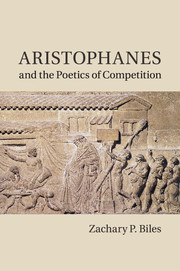Book contents
- Frontmatter
- Contents
- Acknowledgments
- List of abbreviations
- Introduction: proagon
- 1 From Thamyris to Aristophanes: the competitive poetics of the comic parabasis
- 2 The competitive partnership of Aristophanes and Dikaiopolis in Acharnians
- 3 Aristophanes' poetic tropaion: competitive didaskalia and contest records in Knights
- 4 Intertextual biography in the rivalry of Cratinus and Aristophanes
- 5 Aristophanes' Clouds-palinode
- 6 Dionysos and Dionysia in Frogs
- Bibliography
- General index
- Index of passages
1 - From Thamyris to Aristophanes: the competitive poetics of the comic parabasis
Published online by Cambridge University Press: 25 January 2011
- Frontmatter
- Contents
- Acknowledgments
- List of abbreviations
- Introduction: proagon
- 1 From Thamyris to Aristophanes: the competitive poetics of the comic parabasis
- 2 The competitive partnership of Aristophanes and Dikaiopolis in Acharnians
- 3 Aristophanes' poetic tropaion: competitive didaskalia and contest records in Knights
- 4 Intertextual biography in the rivalry of Cratinus and Aristophanes
- 5 Aristophanes' Clouds-palinode
- 6 Dionysos and Dionysia in Frogs
- Bibliography
- General index
- Index of passages
Summary
In the description of Nestor's contingents in the Iliadic Catalogue of Ships, the geographical locale of Dorion provides the opportunity for a minor departure from the theme at hand: it was here that the Muses encountered the Thracian poet Thamyris (Il. 2.594–600), who had boasted that he could defeat anyone, even the goddesses of poetry themselves, if they competed in singing against him. The outcome was in some ways predictable: in anger, the Muses made Thamyris blind or dumb, deprived him of his wondrous song, and made him forget the art of kithara-playing. Thamyris' punishment, in other words, reverses the typical encounter in which the Muses bestow their gifts personally upon an aspiring poet-musician. Within the Iliad, his situation stands in stark contrast with Homer's own thriving relationship with the Muses, on prominent display in the Catalogue itself, with its own elaborate invocation (Il. 2.484–93) that enables the singer to overcome the difficulty his material poses. As Andrew Ford in particular has noted, Thamyris provides a kind of aitiology for poetic agonism, and in this sense the story might imply that formal poetic competitions extended back well before Homer's own time. At the very least, we can say that Thamyris in Homer signifies the trajectory for what became a dominant social ambience for poetic performance in the seventh and sixth centuries, as formal programs of poetic competition were established at festivals in cities and cult places throughout Greece.
- Type
- Chapter
- Information
- Aristophanes and the Poetics of Competition , pp. 12 - 55Publisher: Cambridge University PressPrint publication year: 2011
- 1
- Cited by



